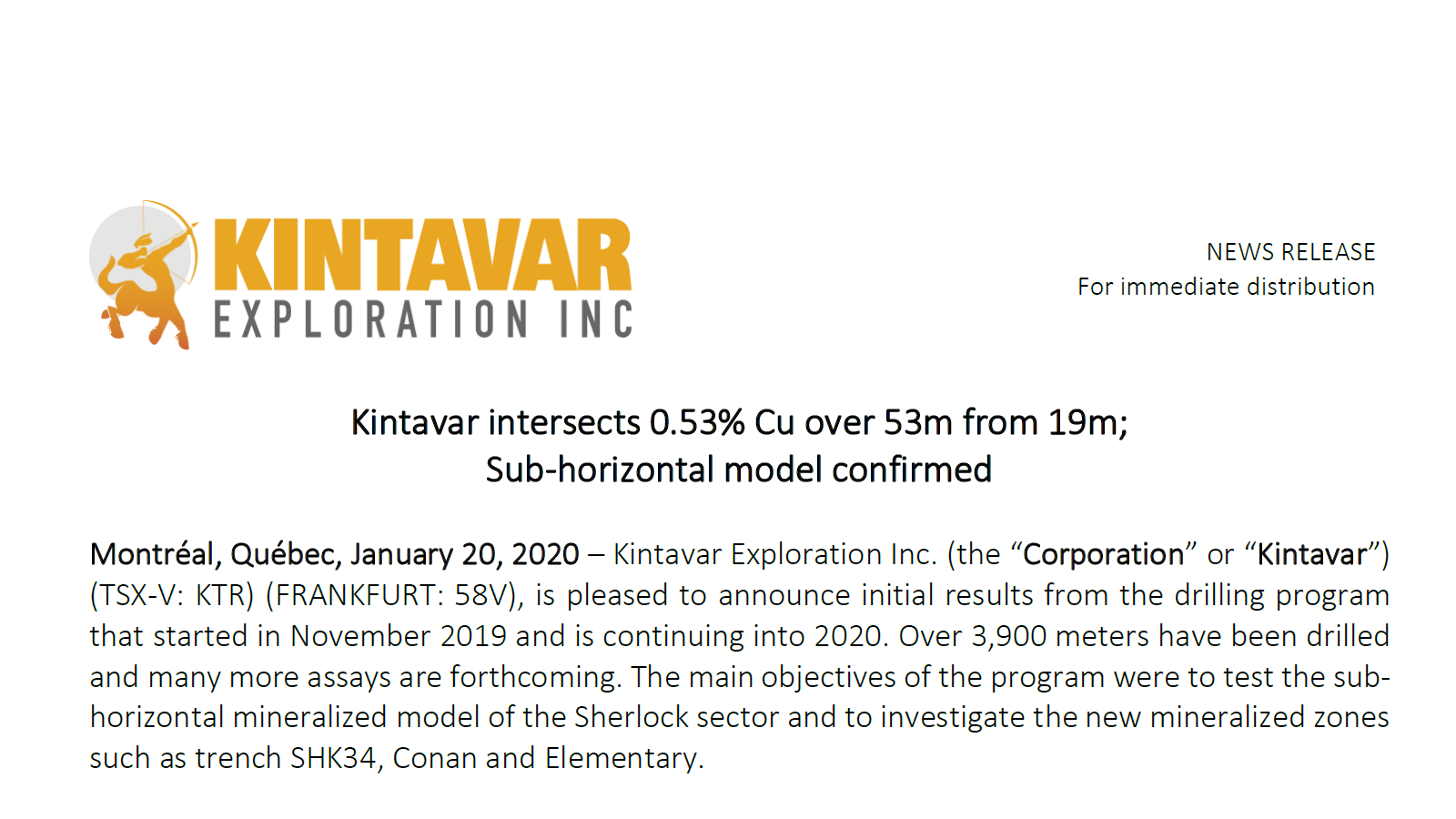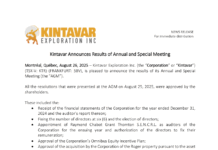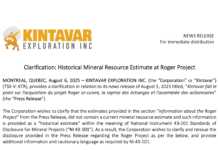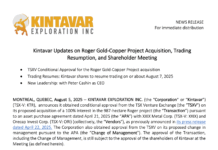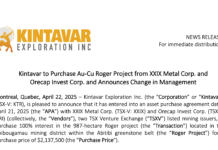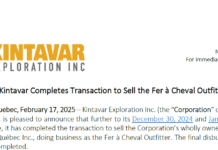Kintavar intersects 0.53% Cu over 53m from 19m; Sub-horizontal model confirmed
MONTREAL, Jan. 20, 2020 (GLOBE NEWSWIRE) — Kintavar Exploration Inc. (the “Corporation” or “Kintavar”) (TSX-V: KTR) (FRANKFURT: 58V), is pleased to announce initial results from the drilling program that started in November 2019 and is continuing into 2020. Over 3,900 meters have been drilled and many more assays are forthcoming. The main objectives of the program were to test the sub-horizontal mineralized model of the Sherlock sector and to investigate the new mineralized zones such as trench SHK34, Conan and Elementary.
Highlights:
- MS-19-51: 40.15m @ 0.44% Cu & 4.3 Ag g/t starting from surface
- MS-19-52: 53.0m @ 0.53% Cu & 4.9 Ag g/t starting from 19m
- Sub-horizontal, lightly dipping stacked mineralized zones confirmed
- Open at depth to the North, East and West
- Sharp contacts of the mineralized zones allow for easy selection of the units
- Clear definition of high grade units that can be treated with floatation versus units that will need to be treated with sorting equipment
“We are very excited to see these first results which confirm our interpretation. The units are now better defined with higher grade and very clear boundaries which would make for easier modeling. The way the mineralization is hosted within the marble units is now much more evident and clearly demonstrates the advantages of shallow mineralization model we have at Mitchi versus a traditional porphyry. Shallow open pit deposits with selective mining have significantly lower capital cost requirements in comparison to the bulk tonnage porphyry deposits. We are looking forward to more results from this ongoing drilling program over the coming months.” comments Kiril Mugerman, President & CEO of Kintavar.
Sherlock Zone
The first six drill holes of the program were performed between the Sherlock trench to the West and the SHK38 trench to the East (Figure 1). All the holes were drilled vertically and each one intersected the mineralized sedimentary units. The 3 holes to the South (MS-19-47, 49 and 51) are presented on the long section (Figure 2) confirming the continuation of the two main mineralized units and the grades.
Many assays are still pending but the lithological units intersected in the 23 short holes in the Sherlock zone in 2019 confirm the sub horizontal lightly dipping mineralized units which remain open to the North, East and West.
The vertical drilling and the new model as well allowed to demonstrate that the mineralized units have very sharp contacts with the surrounding non mineralized units. As a result, the mineralized marble units can now be easily segregated into two categories, those that can be treated directly with flotation (F – grade of approximately 0.50% to 0.40% Cu) versus those that will need to be treated prior with existing sorting technologies (S – grade of approximately 0.15% to 0.40% Cu). This can have an important impact on project economics in the future (e.g. smaller mill, smaller flotation plant, smaller tailings, etc…) in comparison to the previous geological model envisioned in 2018 where much more dilution was present. The Corporation has already completed initial flotation studies (see press release April 24, 2019) which demonstrated high recoveries with very high copper content (up to 80% recovery with up to 59% copper content) due to the predominant presence of the minerals bornite and chalcocite. Sorting test work began in 2019 and will be further refined with these new findings.
Further compilation and modeling continue as more results become available and will be published accordingly. The drilling program has restarted in mid January and currently is focusing on the Conan, Elementary and SHK34 copper zones that were discovered last summer.
Figure 1: Location of the 6 first drill holes on the Sherlock zone:
https://kintavar.com/wp-content/uploads/2020/01/2020-01-20-KTR-Figure1-Plan.pdf
| Sherlock zone – DDH MS-47 to 52 – Fall 2019 | ||||||||
|---|---|---|---|---|---|---|---|---|
| DDH | UTM Nad83 z18 (X) | UTM Nad83 z18 (Y) | DIP | From | To | Thickness* | Type (Flotation vs Sorting) |
Grade |
| MS-19-47 | 483780 | 5252929 | -90 | 3 | 11.8 | 8.8 | S | 0.20 % Cu & 2.2 g/t Ag / 8.8 m |
| 24.5 | 30 | 5.5 | S | 0.27 % Cu & 2.4 g/t Ag / 5.5 m | ||||
| 42 | 49 | 7 | F | 0.50 % Cu & 4.6 g/t Ag / 7.0 m | ||||
| 49 | 72.65 | 23.65 | S | 0.20 % Cu & 3.4 g/t Ag / 23.65 m | ||||
| MS-19-48 | 483768 | 5252963 | -90 | 23 | 27.5 | 4.5 | F | 0.48 % Cu & 7.4 g/t Ag / 4.5 m |
| MS-19-49 | 483731 | 5252930 | -90 | 1.25 | 2.75 | 1.5 | F | 0.55 % Cu & 4.8 g/t Ag / 1.5 m |
| 11.35 | 14.7 | 3.35 | S | 0.15 % Cu & 1.6 g/t Ag / 3.35 m | ||||
| 27.3 | 38.8 | 11.5 | S | 0.11 % Cu & 0.7 g/t Ag / 11.5 m | ||||
| 38.8 | 54.9 | 16.1 | F | 0.45 % Cu & 5.3 g/t Ag / 16.1m | ||||
| 75.9 | 105.25 | 29.35 | F | 0.49 % Cu & 4.4 g/t Ag / 29.35 m | ||||
| MS-19-50 | 483720 | 5252973 | -90 | 6.35 | 17.65 | 11.3 | F | 0.46 % Cu & 3.7 g/t Ag / 11.3 m |
| 25.65 | 31 | 5.35 | S | 0.36 % Cu & 5.8 g/t Ag / 5.35 m | ||||
| 80.7 | 96 | 15.3 | S | 0.12 % Cu & 0.8 g/t Ag / 15.3 m | ||||
| MS-19-51 | 483682 | 5252937 | -90 | 0.75 | 40.9 | 40.15 | F | 0.44 % Cu & 4.3 g/t Ag / 40.15 m |
| 59.15 | 63.75 | 4.6 | S | 0.15 % Cu & 2.9 g/t Ag / 4.6 m | ||||
| 90.8 | 100 | 9.2 | S | 0.19 % Cu & 1.9 g/t Ag / 9.2 m | ||||
| 100 | 105 | 5 | F | 0.41 % Cu & 6.4 g/t Ag / 5.0 m | ||||
| MS-19-52 | 483666 | 5252978 | -90 | 19 | 72 | 53 | F | 0.53 % Cu & 4.9 g/t Ag / 53.0 m |
| 114 | 118 | 4 | S | 0.16 % Cu & 1.7 g/t Ag / 4.0 m | ||||
| 118 | 124 | 6 | F | 0.43 % Cu & 3.9 g/t Ag / 6.0 m | ||||
| * True thickness is estimated between 65 to 95% of the intersected thickness | ||||||||
Figure 2: Long section of the 3 DDH on the front line:
https://kintavar.com/wp-content/uploads/2020/01/2020-01-20-KTR-Figure2-Longsection.pdf
All samples have been sent and prepared (PREP-31) by ALS Global laboratory in Val-d’Or. The pulp was sent to ALS Global laboratory in Vancouver for copper assays (CU-ICP61). silver assays (AG-ICP61) or a multi-elemental analysis by four acid digestion (ME-ICP61) and spectroscopy (ICP-AES/MS). Samples with assays higher than 10,000 ppm Cu were reanalyzed by atomic absorption (CU-OG62) at the ALS Global Vancouver laboratory. Quality controls include systematic addition of blank samples and certified copper standards to each batch of samples sent to the laboratory.
NI-43-101 Disclosure
Alain Cayer, P.Geo., MSc., Vice-President Exploration of Kintavar, is a Qualified Person under NI-43-101 guidelines who supervised and approved the preparation of the technical information in this news release.
About Kintavar Exploration & the Mitchi Property
Kintavar Exploration is a Canadian mineral exploration Corporation engaged in the acquisition, assessment, exploration and development of gold and base metal mineral properties. It’s flagship project is the Mitchi property (approx. 30,000 hectares, 100% owned) located west of the Mitchinamecus reservoir, 100 km north of the town of Mont-Laurier. The property covers an area of more than 300 km2 accessible by a network of logging and gravel roads with a hydro-electric power substation located 14 km to the east. The property is located in the north-western portion of the central metasedimentary belt of the Grenville geological province. Many gold, copper, silver and/or manganese mineralized showings have been identified to date, with many characteristics suggesting of a sediment-hosted stratiform copper type mineralization (SSC) in the Eastern portion of the property and Iron Oxide Copper Gold (IOCG) and skarn type mineralization in the Western portion. Osisko holds a 2% NSR on 27 claims of the southern portion of the Mitchi property, outside of the sedimentary basin.
For further information contact:
Kiril Mugerman, President and CEO
Phone : +1 450 641 5119 #5653
Email : kmugerman@kintavar.com
Web: www.kintavar.com
Forward looking Statements:
Neither TSX Venture Exchange nor its Regulation Services Provider (as that term is defined in the policies of the TSX Venture Exchange) accepts responsibility for the adequacy or accuracy of this release.
This news release contains statements that may constitute “forward-looking information” or “forward looking statements” within the meaning of applicable Canadian securities legislation. Forward-looking information and statements may include, among others, statements regarding future plans, costs, objectives or performance of the Corporation, or the assumptions underlying any of the foregoing. In this news release, words such as “may”, “would”, “could”, “will”, “likely”, “believe”, “expect”, “anticipate”, “intend”, “plan”, “estimate” “target” and similar words and the negative form thereof are used to identify forward-looking statements. Forward-looking statements should not be read as guarantees of future performance or results, and will not necessarily be accurate indications of whether, or the times at or by which, such future performance will be achieved. No assurance can be given that any events anticipated by the forward-looking information will transpire or occur, including additional closings of the private placement referred to above, or if any of them do so, what benefits the Corporation will derive. Forward-looking statements and information are based on information available at the time and/or management’s good-faith belief with respect to future events and are subject to known or unknown risks, uncertainties, assumptions and other unpredictable factors, many of which are beyond the Corporation’s control. These risks, uncertainties and assumptions include, but are not limited to, those described under “Risk Factors” in the Corporation’s management’s discussion and analysis for the fiscal year ended December 31, 2018, which is available on SEDAR at www.sedar.com; they could cause actual events or results to differ materially from those projected in any forward-looking statements. The Corporation does not intend, nor does the Corporation undertake any obligation, to update or revise any forward-looking information or statements contained in this news release to reflect subsequent information, events or circumstances or otherwise, except if required by applicable laws.

